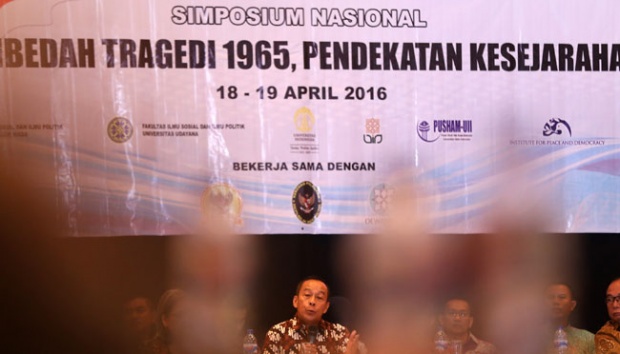
TEMPO.CO, Jakarta - The national symposium 'Dissecting the 1965 Tragedy' was an important step in this nation's journey. It was an initiative to heal wounds. But this must not be half-hearted.
We give thumbs up to National Defense Institute Governor Agus Widjojo and Presidential Advisory Council member Sidarto Danusubroto, the men behind last week's symposium.
This was the first time that the government brought together people involved in the 1965 tragedy. People from opposing sides attended. Survivors, members of victim's families, academics, activists and soldiers who began their careers at the start of the New Order were together in one room. People vied to speak, pouring out their feelings of depression that they had kept inside for half a century.
The symposium was not ideal. Coordinating Minister for Political, Legal and Security Affairs Luhut Pandjaitan began with a strange statement. "Apologize to whom? What victims? There is no way that the government will go round apologizing. No way." This statement prompted a question: If the state does not want to admit it did wrong and apologize for its role in driving the mass violence of 1965, why is there a proposal for reconciliation? Surely, the first step of reconciliation is admitting wrongdoing?
Several speakers at the symposium gave the impression of seeking to belittle the scale of the tragedy by referring to the events of 1965-1966 as a horizontal conflict. This viewpoint was countered effectively by sociologist Ariel Heryanto. History has shown that the hand of the state is always behind the widespread violence that spread to different locations. In this case, hundreds of thousands of people were killed and tens of thousands more were imprisoned without trial for decades.
Horizontal and vertical conflict are more than mere words: They have different consequences. Conflicts that flare up among the people are sporadic, random and kill perhaps a few dozen or hundreds of people. But from 1965 to 1967, there was mobilization of violence that resulted in hundreds of thousands of deaths in a short time. There was training, distribution of weapons and provision of supplies. And after the detainees came home from Buru Island, President Suharto even perpetuated the violence by issuing a 1981 regulation on the 'cleansing of neighborhoods'. Thus, the ostracizing of those involved with the Indonesian Communist Party (PKI), those accused of being PKI and their families continued.
Reconciliation cannot be based on opposing comments, but it must start with the facts. Luhut challenged the data submitted that proved the state played a role in the 1965 tragedy. But this is not a difficult challenge to refute. From 2009 to 2012, the National Human Rights Commission (Komnas HAM) investigated cases across the nation. The testimony of victims and perpetrators and the examination of mass graves provided strong evidence for mobilization of mass violence and gross violations of human rights in 1965, which continued until early 1970.
This symposium is not the finish line. It is only the first step. If it really wants to heal old wounds, the state needs to apologize for its role in the past. And there must be effort to uncover the truth in many forms. There must be rehabilitation of people's reputations, especially those slandered and imprisoned on Buru Island without trial.
If the government is not prepared, or lacks the courage, to admit the role of the state in the 1965 tragedy, it should just forget the idea of reconciliation. Without an acknowledgement and apology, reconciliation will remain an empty word. (*)
Read the full story in this week's edition of Tempo English Magazine























